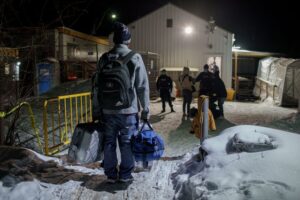
Immigration advocacy organisations have expressed outrage over a deal that allows border guards to turn away asylum seekers who are travelling north across their shared frontier without taking into account their requests for sanctuary.
As US President Joe Biden makes his first official trip to Canada since assuming office in early 2021, Canadian and US media outlets on Thursday reported the tentative agreement.
On Friday, the deal is anticipated to be confirmed by Biden and Justin Trudeau, the prime minister of Canada.
The action was denounced as “unprincipled and dangerous” by Canada’s Migrant Rights Network, who added that it would “force migrants to take even more dangerous routes” in their search for safety.
As the US and Canada agree to more stringent measures to turn back refugees in response to attacks from conservative lawmakers, immigration rights groups have accused both leaders of breaching their obligations to asylum seekers.
The reportedly reached deal enlarges the Safe Third Country deal’s scope. (STCA). According to the agreement, refugees can ask for asylum in either the US or Canada, depending on which nation they arrive in first.
According to that policy, Canada has the authority to deny entry to asylum applicants at authorised checkpoints along the US border without taking their petitions into account.
If they reached Canadian territory, they could still submit an application for asylum. An estimated 39,000 individuals crossed into Canada illegally last year, using places like Roxham Road, a dirt road connecting the Canadian province of Quebec and the US state of New York that has come to represent the country’s immigration policies.
Conservative politicians like Pierre Poilievre have poked fun at Trudeau over the situation, accusing him of being reluctant to crack down on illegal immigration and calling for Roxham Road to be shut down.
Francois Legault, the premier of Quebec, urged the Trudeau administration to rewrite the STCA in an opinion piece published last month in the Canadian daily Globe and Mail. He claimed that the province’s ability to house the recently arrived asylum seekers had “largely been exceeded.”
In reaction to inquiries from Trudeau’s office, the office stated that it was unable to corroborate the reports from Thursday’s media and declined to comment on the criticism from refugee rights organisations.
Since its inception, the agreement, which was first inked in 2002 and has been in force since 2004, has generated controversy, with Canadian rights organisations requesting that the policy be loosened or abolished entirely. The Trudeau government has instead worked to defend and now increase its use.
To more equally distribute the challenges, the government has temporarily moved asylum seekers from Quebec to other provinces.
According to experts, such measures can only provide temporary relief, and instead of cracking down on unauthorised border crossings, Canada should increase the number of refugees who can apply for asylum in a secure and orderly way.
“Trying to seal the border is totally impractical. If Roxham Road is closed, another will just appear somewhere else, said immigrant attorney Maureen Silcoff in a recent phone conversation.
People are pushed to Roxham Road by the STCA itself because they are unable to file for asylum at authorised ports of entry.
She continued by saying that when options for requesting asylum are limited, individuals are rarely discouraged. She pointed out that instead, despite the higher dangers involved, they look for more isolated entry points into the nation.
People will perish if they continue down a road of stricter regulations, warned Silcoff.
The STCA has also been subject to ongoing judicial challenges and has twice been declared invalid by judges. The policy has been upheld by appeals courts twice; it is currently being considered by Canada’s Supreme Court, where advocacy organisations are hoping it will be declared unconstitutional.
In light of reports of substandard conditions in US immigration detention facilities, such organisations have also questioned the idea that the US is a secure destination for refugees.
According to Jamie Liew, an immigration specialist at the University of Ottawa, “Canada has an international reputation as a country with a history of assisting refugees.”
“We have a method that is regarded as the gold standard for evaluating refugee claims. Why not give it a shot? People could pass easily and dignifiedly if we opened our formal ports of entry.
Experts warn that the number of people fleeing hopeless situations is unlikely to decrease anytime soon, especially in light of the fact that climate change is a major cause of emigration, specifically in developing nations.
The United Nations Refugee Agency estimates that in 2022, more than 100 million people will have been compelled to leave their houses.
Nearly 5 million people departed their nations the previous year in search of safety.
When compared to other nations, “what Canada faces is a drop in the bucket,” said Liew. “We must permit individuals to submit claims for refugee status.”




